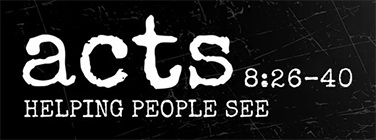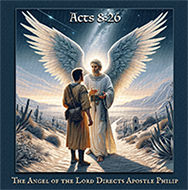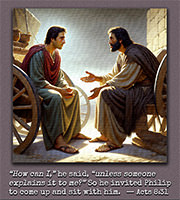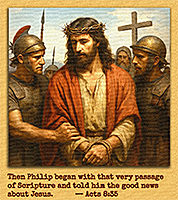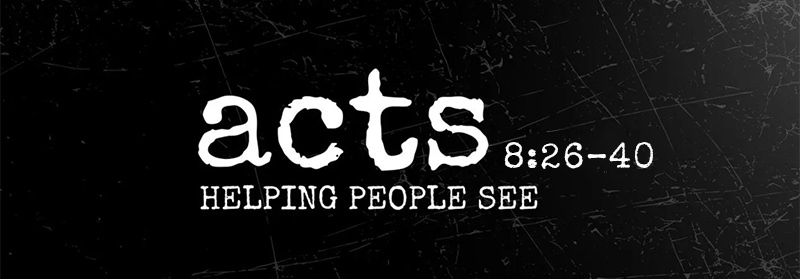
Acts 8:26–40 . . .
“Philip’s Teaching and Baptizing of the Ethiopian”
This week's summary will use a different approach than usual. It'll start with a brief wrap-up, followed by a more in-depth study of a number of key elements. Last week, we read in v. 25 that Apostles Peter and John had finished their ministry in Samaria and headed back to Jerusalem, preaching Jesus as they went. Apparently the task in Samaria was finished, so that the evangelist Philip could leave to minister elsewhere. The disciples left, heading back to Jerusalem, while Philip was directed to go the opposite way on a desert road leading from Jerusalem to Gaza.
[Note: Find and read today’s Scripture near the bottom of this page.]
Acts 8–12 shows us how the early Jesus community becomes an international movement.
Philip in Samaria | Sorcerer Simon | Philip and the Ethiopian (ch. 8)
Saul’s Conversion | Saul in Damascus and Jerusalem (ch. 9)
Cornelius Calls for Peter | Peter’s Vision | In Cornelius’ House (ch. 10)
Peter Explains His Actions | The Church in Antioch (ch. 11)
Peter’s Miraculous Escape From Prison | Herod’s Death (ch. 12)
› Watch BibleProject’s superb animated video (2 min.) that highlights Luke’s account of the growing multi-ethnic Church.
Notice in today's text that Philip wasn't told why he was to go that way, although he'd soon find out. In fact, he wasn't told anything about what ministry he'd perform or to whom; he was simply instructed to go in a certain direction. Philip faithfully obeyed and thus encountered a eunuch who was a very influential man, a court official of the Queen of Sheba (queen of Ethiopia). He was in charge of her treasury (v. 27).
Apostle Philip (enlarge image) was pointed in the right direction. He was required to assess a situation and respond appropriately. He wasn't to miss this opportunity. The eunuch was reading Scriptures aloud. Luke specifically indicates that the Ethiopian eunuch was reading Isaiah 53:7–8. If this is where he was in Isaiah that specific moment, clearly he'd already read the earlier verses, which are all about the Messiah, our Lord Jesus Christ. Philip didn't need to be told what to do next. He asked the eunuch if he understood what he was reading. The eunuch didn't. He couldn't figure out whether Isaiah was speaking of himself or someone else. So he invited Philip into his chariot, so that he could explain the meaning of this prophecy.
Eager to explain the importance of that Scripture, Philip preached the Lord Jesus to the eunuch. We’d have loved to have been there to hear Philip's hearty Bible discourse with the Ethiopian. It was probably something similar to what Jesus taught these two men on the road to Emmaus (Luke 24:13–35). The heart of the eunuch was prepared, and he quickly embraced Jesus as his Messiah. The two approached a water source, perhaps an oasis of some kind, and the eunuch seized this opportunity to be baptized. When they came out of the water, Philip was snatched away by the Spirit, and the eunuch went on his way back to Ethiopia, rejoicing in his salvation.
Led by the Spirit (8:26–29)
Let’s look more closely at this passage. The encounter unfolds as a tightly ordered, Spirit‑led chain: God directs Philip away from a fruitful work, positions him beside a prepared seeker, and uses Scripture to lead that man to Christ and his eventual baptism. The initiative is entirely God’s as one of his angels conducts the apostle on his next assignment. Philip simply “got up and went,” leaving a thriving ministry in Samaria for an apparently empty, wilderness route — a move that only makes sense if God is orchestrating a particular meeting.
We might have thought that Philip would have objected to leaving the great success of the disciples’ work in Samaria to go out to a desolate desert. But God had a plan for Philip, and he became noticeably submissive to God’s plan.
Reading that Philip was to take “the desert road,” we must realize that his errand was foolish from man’s perspective, yet it wise in God’s perspective. What could be more foolish than to leave a place of prospering ministry and go to a road of a desert?
On that desert road, Philip encountered an Ethiopian who was a new believer in Judaism, returning from Jerusalem, reading the Bible! Being an important official, the Ethiopian was undoubtedly a successful man. Yet his success obviously didn’t answer all the questions in his belief. He knew he needed some genuine, truthful, spiritual answers in his life, so he was seeking God. He was in charge of the treasury of Kandake, which was a certain female royalty in Ethiopia. Hungry for God's Word, the Ethiopian was reading aloud the Book of Isaiah the prophet. Typically, such a scroll of Scripture would have cost him a lot of money, so he clearly thought it was worth the investment and wanted to read it!
Philip Preaches “Jesus” to the Ethiopian (vv. 30–35)
“The Spirit told Philip . . .” It took real boldness for Philip to run right up to the Ethiopian’s chariot and speak to him, but that's what the Holy Spirit told him to do. The Ethiopian was a rich man, a man of power; in at least some way he was a celebrity. Yet Philip knew that the eunuch needed Jesus just a much as anyone else. Philip wasn't hesitant to tell a prominent person about Jesus. [How are you doing these days at running up to and telling "important" people about Jesus? If you're afraid to tell people about Jesus, remember that the Spirit of Jesus is telling you to do so; and he'll give you the words, attitude, and conviction to tell your personal story. Don't hesitate to share Jesus' wonderful news to others, whether they're important people or not.]
Philip knew at that moment that God had given him an open door and a prepared heart. Plainly, God had prearranged this meeting between Philip and the Ethiopian. This is a glorious example of how God opens doors for us today to evangelize. Philip was effective as an evangelist because he knew how to flow with what the Holy Spirit wanted him to do. He was truly led by the Spirit, not by his own whims and feelings.
This text in v. 30 — "Philip . . . heard the man reading." — might make you wonder. In the ancient world, it was common to read aloud. So, Philip knew what the Ethiopian was reading by listening to him reading the prophet Isaiah's words aloud. It was good for the Ethiopian to be reading the Bible, but unless understanding was brought to him, little benefit would be gained. Fortunately, God had brought someone to bring the man such much-needed understanding. While it's glorious when we come to understand the great truths of Scripture on our own, God always provides a place and purpose for teachers, preachers, and facilitators in the body of Christ to help people understand Scriptures.
Not yet understanding Isaiah's passage, the Ethiopian asked Philip, "Who is the prophet talking about, himself or someone else?" (v. 34). Regarding this passage from Isaiah 53:7–8, the Jews of that day had different ways they interpreted the identity of this suffering servant. Some thought that the suffering servant was the nation of Israel itself, since Israel had suffered greatly in wars, exile, and persecution. Some thought the suffering servant was Isaiah, writing about himself. And some thought the suffering servant was the Messiah, but they found that hard to accept because they didn't want to think of a glorious Messiah suffering.
“Then Philip began with that very passage of Scripture.” Philip talked about more than this passage from Isaiah, but this is where he started; it was common ground with the Ethiopian. But Philip made the effort to talk about Jesus, talking easily about Jesus beginning at "that very passage of Scripture." Philip's effective preaching consisted of his explaining who Jesus was (like a quiet, humiliated lamb) and what he'd done for us (having been led unjustly as a sheep to its slaughter). Today, explaining who Jesus is and what he's done for us is the essence of the gospel. May we strive to emulate Philip by talking personally to others about Jesus.
The Ethiopian Responds as Philip Departs (vv. 36–40)
… by Jan van ’t Hoff at GospelImages
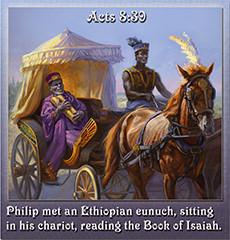
Click to enlarge and download this image
of the Ethiopian eunuch reading Isaiah:
Acts 8:39.
The Ethiopian was ready to respond to the gospel message that Philip personally made available to him. Note: This was the Holy Spirit’s work, not a tribute to Philip’s “bravado” or “salesmanship.”
“If you believe with all your heart, you may.” Philip insisted that the Ethiopian believe with all his heart before being baptized. In a nutshell, this describes how we should respond to the gospel: Believe with all [our] heart. Further, the eunuch responded, “I believe that Jesus Christ is the Son of God.” His confession of faith is the essential belief for anyone who'll sincerely approach God. We must be hearty enough to believe in the person of Jesus, in all that he is and has done as the Christ. We must truly believe that he's the Divine Son, the Son of God, sent from the Father to accomplish the salvation of all those who'll believe in him with all their hearts.
“Both Philip and the eunuch went down into the water and Philip baptized him.” Clearly, by having gone “down into the water,” Philip immersed the Ethiopian in baptism. This wasn't a sprinkling but an immersion baptism. Suddenly, the Spirit of the Lord carried Philip away while the Ethiopian was still in the water where he'd been baptized! Philip was then "transported" supernaturally to the former Philistine city of Lotus (also known as Ashdod). As is clear in the video clip linked below, the joy of the Ethiopian, even after Philip's surprising departure, documents that his faith was firmly rooted in God, not in Philip the evangelist.
Closing Considerations
Let's not miss the fact that this mission of Philip's had been directed by an angel. We might suppose that after his triumphant soul-winning campaign in Samaria, Philip sought God’s direction as to where he should go next. So we learn in the opening verse that an angel told him what he should do and where he should do it. The angel’s instruction to go south probably meant that Philip should take the road that went through Bethlehem and Hebron before turning westward, ultimately joining the coastal road at Gaza. Without delay, Philip went to the appointed place and waited. Perhaps soon after arriving at his stopping place, he saw a chariot coming south, heading toward Egypt, with a man sitting inside it holding a scroll and reading from it aloud.
While it was an angel who directed Philip's mission, it was the Spirit who prompted Philip to run up to the chariot with the intent of starting a conversation, which would have been easy for Philip to do after hearing what the eunuch was reading. That wonderful prophecy of Isaiah told that Christ would die in our place to pay the penalty for our sins. The Ethiopian's request for Philip's instruction is a clue that the eunuch was a recent convert to Judaism, for he implied that he'd never heard anyone else teach Isaiah.
In attempting to understand the prophecy, the eunuch had come to the accurate conclusion that the Scripture writer might be portraying someone other than himself. Philip explained that the suffering lamb wasn't Isaiah himself, but the Christ, and that the Christ had recently come in the person of Jesus. He went on to show the eunuch that Jesus also fulfilled many other prophecies in the Old Testament.
By conveyance of the Spirit, Philip either flew through the air to a new location or changed locations instantly. For the eunuch, the miracle of Philip’s startling disappearance was a sign confirming the truth of the gospel. It was also God’s reward to him for his faith. Finding himself alone, the eunuch reflected on his new salvation in Christ and "went on his way rejoicing." Philip was greatly used by God because he never wasted or missed acting on his opportunities to evangelize. When the Spirit instructed him to travel many miles to an uninhabited desert for an undisclosed reason, he went right away, no questions asked, and he witnessed to the first person to whom the Spirit had pointed him. May each of us similarly not be hesitant to respond to the Spirit's next directive to reach out and witness.
† Summary of Acts 8:26–40
In 8:26–40, Philip obeys the Spirit’s prompt to leave Samaritan crowds for a desert road, where he encounters an Ethiopian eunuch — a court official reading Isaiah 53 aloud in his chariot — and explains how it foretells Jesus as the suffering servant who was led like a lamb to slaughter, cut off from humanity yet exalted by God.
Guided by the eunuch’s eager questions, Philip preaches the full gospel of Jesus, leading to the official’s baptism in nearby water; instantly, the Spirit snatches Philip away to Azotus, while the rejoicing Ethiopian continues his journey transformed.
Key points with verse references:
• Spirit-led redirection: Philip leaves revival for solitude, modeling obedience to divine interruptions over visible success (8:26–29).
• Scripture’s clarity: Isaiah 53 reveals Jesus’ humiliating death and vindication, opening faith to an African outsider (vv. 30–35).
• Inclusive salvation: The eunuch — barred from full Jewish temple worship — believes, confesses Jesus as Lord, and is baptized without delay (vv. 36–38).
• Sudden advance: Philip preaches onward as the eunuch spreads gospel seeds back home, fulfilling worldwide witness (vv. 39–40).
- Q. 1 What are some of the evangelistic characteristics that Philip demonstrates during this encounter?
- Q. 2 Why is the eunuch so eager to be baptized?
- Q. 3 From the way God sets up opportunities to witness, how does that free you from fears in evangelism?
- Q. 4 How can you grow in faith so you'll be prepared for surprise opportunities to witness?
Acts 8:26–40
New International Version (NIV)
[View it in a different version by clicking here; also listen to chapter 8.]
† Watch this video clip of Acts 8:22–9:33, starring Bruce Marchiano as Jesus, James Brolin as Simon Peter, Harry O. Arnold as Saul/Paul, and Dean Jones as Luke.
Philip and the Ethiopian
26Now an angel of the Lord said to Philip, “Go south to the road — the desert road — that goes down from Jerusalem to Gaza.” 27So he started out, and on his way he met an Ethiopian eunuch, an important official in charge of all the treasury of the Kandake (which means “queen of the Ethiopians”). This man had gone to Jerusalem to worship, 28and on his way home was sitting in his chariot reading the Book of Isaiah the prophet. 29The Spirit told Philip, “Go to that chariot and stay near it.”
30Then Philip ran up to the chariot and heard the man reading Isaiah the prophet. “Do you understand what you are reading?” Philip asked.
31“How can I,” he said, “unless someone explains it to me?” So he invited Philip to come up and sit with him.
32This is the passage of Scripture the eunuch was reading:
“He was led like a sheep to the slaughter,
and as a lamb before its shearer is silent,
so he did not open his mouth.
33In his humiliation he was deprived of justice.
Who can speak of his descendants?
For his life was taken from the earth.”
34The eunuch asked Philip, “Tell me, please, who is the prophet talking about, himself or someone else?” 35Then Philip began with that very passage of Scripture and told him the good news about Jesus.
36As they traveled along the road, they came to some water and the eunuch said, “Look, here is water. What can stand in the way of my being baptized?” 37Philip said, “If you believe with all your heart, you may.” The eunuch answered, “I believe that Jesus Christ is the Son of God.” 38And he gave orders to stop the chariot. Then both Philip and the eunuch went down into the water and Philip baptized him. 39When they came up out of the water, the Spirit of the Lord suddenly took Philip away, and the eunuch did not see him again, but went on his way rejoicing. 40Philip, however, appeared at Lotus and traveled about, preaching the gospel in all the towns until he reached Caesarea.

